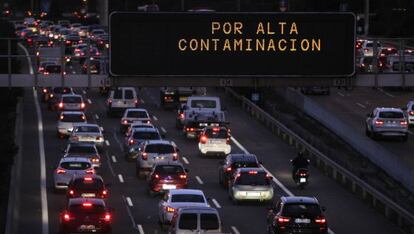As restrictions are put into place, Spain’s pollution becomes patent
Traffic measures, parking bans and factory stoppages are raising awareness of issue


Warnings, traffic restrictions, factory stoppages... Pollution-related problems are becoming increasingly visible in many parts of Spain due to alert systems that have been introduced by local and regional governments.
Measures like the ones recently seen in Madrid – with speed limits on the capital’s inbound roads and downtown parking bans – are “very important” because they raise public awareness, says Miguel Ángel Ceballos, of the green group Ecologistas en Acción.
In order to solve a problem, first you have to acknowledge its existence, and until recently authorities were refusing to do that”
Miguel Ángel Ceballos, Ecologistas en Acción
“In order to solve a problem, first you have to acknowledge its existence, and until recently authorities were refusing to do that,” he notes.
A succession of anticyclones – areas of high-pressure – in the last few weeks have created favorable conditions for legal pollution limits to be surpassed, as pollutants are not dispersed by the wind under such conditions.
In Madrid, the problem is mostly nitrogen dioxide, which can trigger respiratory problems and is linked to traffic.
Every since the new pollution protocol went into effect in November, Madrid authorities have issued Scenario 1 alerts four times, forcing drivers to reduce their speed to 70km/h on the M-30 ringroad and other access points. That protocol went into effect again just today.
The city has also activated Scenario 2 on two occasions, which adds downtown parking bans for most vehicles.
The city’s mobility chief, Inés Sabanés, holds that these restrictions are effective at “stopping the episodes” of temporary pollution.
“But they are emergency measures,” she notes. “The main thing is to establish structural measures.”
Catalonia and Asturias
Last week, Catalan authorities also introduced speed limits of 90km/h in the Barcelona metropolitan area. In that case, the alert was activated because of a high concentration of PM-10 particulate matter, which is also tied to respiratory trouble.
Meanwhile, the lack of rain has caused a similar problem in the small northern region of Asturias. A spokeswoman for the regional public works department says that the cities of Avilés and Gijón have had pollution action plans since the summer of 2014. Last Sunday, both went into pre-alert level, which entails hosing down some streets to disperse the particulate matter and banning heavy vehicles from some industrial areas.
At this department’s request, the steel manufacturer Arcelor-Mittal agreed to push forward a 24-hour technical stoppage at their plant in Veriña.
English version by Susana Urra.
Tu suscripción se está usando en otro dispositivo
¿Quieres añadir otro usuario a tu suscripción?
Si continúas leyendo en este dispositivo, no se podrá leer en el otro.
FlechaTu suscripción se está usando en otro dispositivo y solo puedes acceder a EL PAÍS desde un dispositivo a la vez.
Si quieres compartir tu cuenta, cambia tu suscripción a la modalidad Premium, así podrás añadir otro usuario. Cada uno accederá con su propia cuenta de email, lo que os permitirá personalizar vuestra experiencia en EL PAÍS.
¿Tienes una suscripción de empresa? Accede aquí para contratar más cuentas.
En el caso de no saber quién está usando tu cuenta, te recomendamos cambiar tu contraseña aquí.
Si decides continuar compartiendo tu cuenta, este mensaje se mostrará en tu dispositivo y en el de la otra persona que está usando tu cuenta de forma indefinida, afectando a tu experiencia de lectura. Puedes consultar aquí los términos y condiciones de la suscripción digital.








































